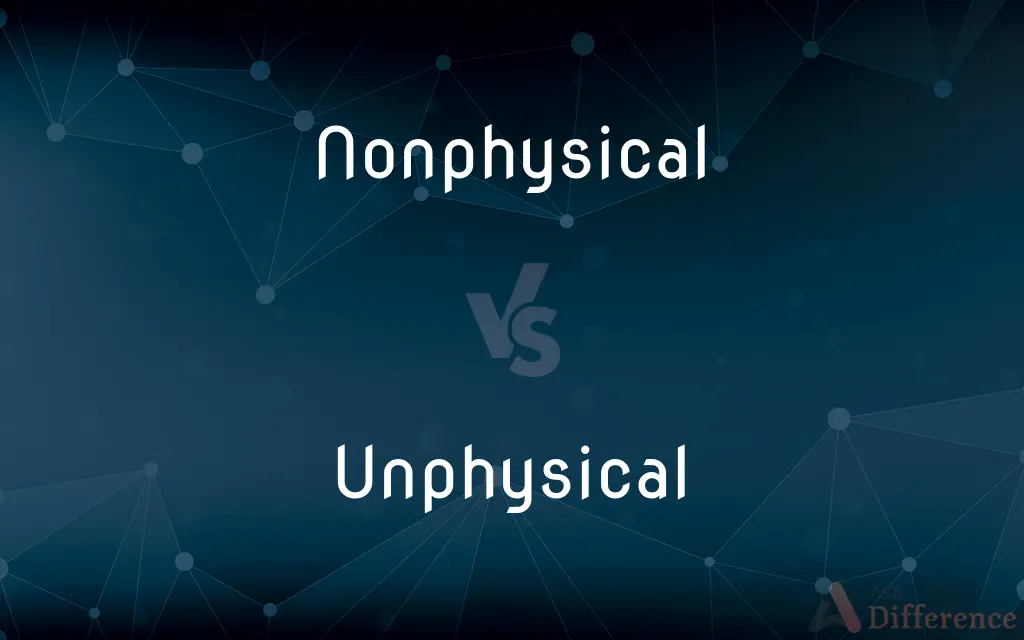Nonphysical vs. Unphysical — What's the Difference?
Edited by Tayyaba Rehman — By Urooj Arif — Updated on March 11, 2024
Nonphysical refers to things not related to the physical or material world, emphasizing the abstract or conceptual, while unphysical suggests deviation from physical laws or norms, often used in scientific contexts.

Difference Between Nonphysical and Unphysical
Table of Contents
ADVERTISEMENT
Key Differences
Nonphysical pertains to aspects or phenomena that exist beyond the tangible, material realm. This term is frequently used to describe ideas, emotions, and other abstract concepts that don't have a physical presence but are very much a part of human experience. Whereas unphysical is often employed in scientific or theoretical discussions to indicate something that doesn't conform to the established laws of physics, suggesting an impossibility or theoretical concept within current understanding.
Nonphysical qualities include thoughts, feelings, and spiritual beliefs—elements of existence that do not occupy physical space or have mass but significantly impact human life and consciousness. On the other hand, unphysical characteristics might refer to hypothetical particles, forces, or phenomena in scientific models that, if real, would violate known physical laws, serving more as tools for theoretical exploration than descriptions of reality.
The usage of nonphysical is broader and can apply to various fields including psychology, philosophy, and spirituality, highlighting the diverse dimensions of human existence beyond the physical. Whereas unphysical is more niche, primarily used within physics and closely related disciplines to discuss concepts that challenge or expand upon current physical theories.
Nonphysical often encourages exploration of the mental, emotional, and spiritual aspects of life, fostering discussions about meaning, ethics, and the essence of being. In contrast, unphysical prompts critical thinking and theoretical inquiry within scientific communities, pushing the boundaries of what is considered possible or real according to physical laws.
Both terms, while focused on the non-material, serve different purposes: nonphysical enriches our understanding of the intangible aspects of human experience and the universe, while unphysical challenges and refines our scientific understanding of the physical world.
ADVERTISEMENT
Comparison Chart
Definition
Not related to the physical/material world.
Deviating from established physical laws.
Contexts
Psychology, philosophy, spirituality.
Science, particularly physics.
Examples
Thoughts, emotions, spirituality.
Hypothetical particles, theoretical phenomena.
Purpose
Explore abstract concepts of human experience.
Challenge and expand current scientific theories.
Application
Broad, across various fields.
Niche, within specific scientific discussions.
Compare with Definitions
Nonphysical
Emphasizes abstract concepts.
Love and justice are considered nonphysical entities.
Unphysical
Deviation from physical norms.
The concept of unphysical energies challenges conventional physics.
Nonphysical
Not bound by physical laws.
Spiritual beliefs often explore nonphysical realms of existence.
Unphysical
Niche scientific application.
Unphysical phenomena are often subjects of speculative physics.
Nonphysical
Concerns beyond the material.
Meditation focuses on nonphysical aspects of well-being.
Unphysical
Used in theoretical contexts.
Scientists proposed unphysical particles to explain anomalies.
Nonphysical
Impact on human experience.
The nonphysical connection between people can deeply influence relationships.
Unphysical
Highlights theoretical impossibilities.
An unphysical scenario in a model may indicate errors or the need for new theories.
Nonphysical
Broad application.
Nonphysical phenomena are central to many philosophical debates.
Unphysical
Promotes scientific inquiry.
Discussing unphysical ideas can lead to breakthroughs in understanding physical laws.
Nonphysical
Not physical; not using kinetic energy
Unphysical
Not physical.
Nonphysical
Not having physical form; insubstantial
Unphysical
Not supported by, or contrary to, the laws of physics.
Nonphysical
Lacking substance or reality; incapable of being touched or seen;
That intangible thing--the soul
Common Curiosities
What does unphysical mean?
Unphysical describes phenomena that do not conform to or violate established physical laws, often used in theoretical physics.
How does the concept of unphysical help in science?
The concept of unphysical can stimulate theoretical development and innovation by challenging scientists to rethink and expand existing physical laws.
What does nonphysical mean?
Nonphysical refers to things that do not have a physical presence, such as thoughts, feelings, or spiritual concepts.
Are nonphysical phenomena scientifically recognized?
While nonphysical phenomena like emotions or thoughts are recognized by science, they are studied in fields like psychology rather than physics.
How are nonphysical and unphysical concepts used differently?
Nonphysical concepts are broadly applied across various humanistic fields to explore abstract aspects of life, while unphysical concepts are specifically used in scientific contexts to discuss and theorize about phenomena that challenge physical laws.
Can something be both nonphysical and unphysical?
Conceptually, yes, especially in theoretical discussions where an idea might not only be abstract but also challenge physical norms.
Why are nonphysical aspects important to consider?
Nonphysical aspects are crucial for understanding human psychology, ethics, and spirituality, offering a complete view of human experience beyond the material.
What is an example of a nonphysical quality?
An example of a nonphysical quality is empathy, an emotional capacity to understand and share the feelings of another.
How do unphysical theories contribute to physics?
Unphysical theories can highlight gaps in current understanding, suggesting directions for new research or the development of new theoretical frameworks.
What might be considered an unphysical hypothesis?
An example of an unphysical hypothesis could be the existence of particles that travel faster than light, contradicting Einstein's theory of relativity.
Share Your Discovery

Previous Comparison
Auditorium vs. Theatre
Next Comparison
Cloy vs. SateAuthor Spotlight
Written by
Urooj ArifUrooj is a skilled content writer at Ask Difference, known for her exceptional ability to simplify complex topics into engaging and informative content. With a passion for research and a flair for clear, concise writing, she consistently delivers articles that resonate with our diverse audience.
Edited by
Tayyaba RehmanTayyaba Rehman is a distinguished writer, currently serving as a primary contributor to askdifference.com. As a researcher in semantics and etymology, Tayyaba's passion for the complexity of languages and their distinctions has found a perfect home on the platform. Tayyaba delves into the intricacies of language, distinguishing between commonly confused words and phrases, thereby providing clarity for readers worldwide.














































